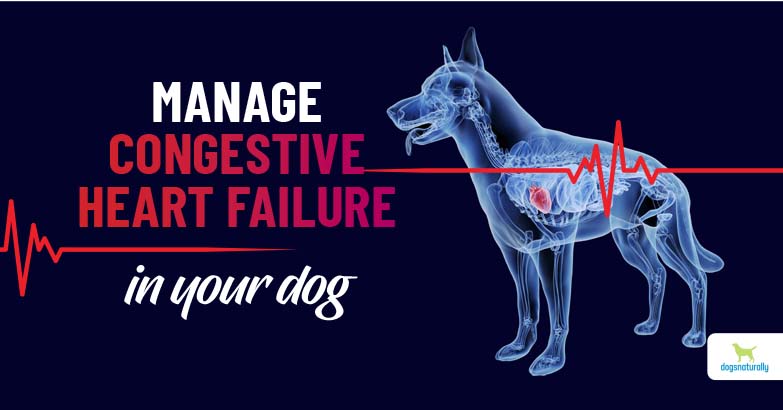Congestive heart failure in dogs is a terrible thing to have to deal with.
I’ve seen many dogs with congestive heart failure (CHF) over the years. And until recently the only options I had to treat them were prescription drugs – something I don’t like to do!
Thankfully, that has changed. But before I get into treatments, let’s take a little time to talk about the causes of CHF and the signs you’ll see if your dog develops this disease.
What Causes Congestive Heart Failure In Dogs?
The heart is very, very important. Damaged heart valves and dilated cardiomyopathy are the two most common causes (or what seem to be causes) of CHF. Some breeds commonly have genetically defective valves and have a much higher incidence of CHF than other breeds. This includes King Charles Cavalier Spaniels.
But no matter the cause, the underlying issue in all cases of CHF is a degradation of the cardiovascular system’s ability to pump blood effectively.
It’s important to note here that the heart is an important part of the pumping system for blood. But it’s by no means the only part of the body that actively pumps blood.
All the arteries (from large to very small) actively pump blood in synchrony with the heart. There’s a wave of relaxation followed by a spiraling wave of contraction. This wave flows along every artery and syncs with each heartbeat. Supporting the health of all the blood vessels and the cardiovascular system as a whole is critical in preventing and treating CHF. The capillary bed is especially important. It’s an active part of the system that pumps blood around the body.
So there are other causes that aren’t directly related to problems with the heart valves, muscle or vascular system. These are definitely less common causes of congestive heart failure in dogs and include:
- Defects in the heart walls
- Fluid builds in the sac surrounding the heart
- Arrhythmias
- Heartworm disease
- High blood pressure
- Endocarditis (an infection of the heart valves)
- Tumors
- Pregnancy
Knowing this, I sometimes wonder if these problems are often due to damage to the heart secondary to other issues. Specifically, issues that increase blood pressure or increase resistance to the flow of blood. Which comes first? The chicken or the egg?
For instance, if the elasticity of the capillary bed becomes compromised, the heart overworks to get blood throughout the body. Is it this stress over time that leads to the damage to the valves and the heart muscles?
Symptoms Of Congestive Heart Failure In Dogs
If your dog has damaged heart valves, your vet will be able to hear a murmur with her stethoscope. This sound happens when the blood squirts back through the defects in the valves when the muscle squeezes. Grading for murmurs rank from I to V depending on the severity.
What happens when the cardiovascular system isn’t able to pump blood effectively? Fluid will back up in one of two places in the body: either the lungs or the abdomen.
Coughing is another sign of congestive heart failure. This happens if fluid gathers in the lungs. It usually starts off as a very quiet, inoffensive occasional cough, which many people don’t think is significant. As the CHF gets worse, the cough gets more frequent, more obvious, and is usually productive. The chest becomes waterlogged, with wheezes and crackles that are evident when listening with a stethoscope.
If fluid gathers in the abdomen, your dog will develop a potbelly. In extreme cases this will cause so much pressure that he’ll have difficulty breathing. No matter where the fluid gathers, you’ll see decreased exercise tolerance.
RELATED: Is there a link between heart and grain-free foods? Here’s what the FDA warns …
Conventional Treatment For Congestive Heart Failure
Conventional vets typically treat CHF with prescription medicines. This may be diuretics, which cause the kidneys to excrete extra water to clear out the excess from the lungs or abdomen. The problem is that this puts extra pressure on the kidneys, potentially harming them.
They may also prescribe drugs that make the heart muscle pump more strongly. The problem here is that these drugs sometimes put extra pressure on the valves and can cause more damage. Vets may also prescribe vasodilators to reduce the blood pressure. They open the blood vessels to allow blood to flow more easily.
I avoid these medicines until they’re a dog needs them for palliative care.
But if your dog already has congestive heart failure, what natural options exist?
Holistic Options For CHF In Dogs
I’ve had some interesting success with complementary treatments. Please be aware that these results may not be typical, and that each case is unique. You may need to try different things and not all things will work in all cases.
1. Acupressure And Acupuncture
I had one old Standard Poodle who was at death’s door. I’d done an acupressure course, and we decided to give him some treatments. He had an honest to god miraculous response. His heart murmur improved by at least a grade, maybe two, and he got a new lease of life. He went on for another year or more. He did need to stay on medication, but we were able to significantly reduce the dose. This case tells me that acupuncture or acupressure can be a great help.
2. CBD Oil
Another old dog I tended to went onto a raw whole-plant cannabis extract. After a month on this his owners reduced his diuretics completely. His cough didn’t come back and he was very active and happy. And (much to my surprise) his heart murmur also got significantly less severe – which simply doesn’t happen! Trialing on CBD may be of benefit. There’s some research that supports its efficacy with treating cardiovascular issues.
RELATED: Choosing the best CBD oil for dogs …
3. Herbs
There are also other herbs that can be of value, especially if you can catch the disease early. It’s best to have these prescribed by a skilled naturopath or herbalist.
- Dandelion is a gentle diuretic.
- Hawthorn can help the heart pump more strongly.
- Motherwort is a lovely cardiac tonic.
If your dog has CHF, no matter what you do, you’ll probably need prescription medications in the end. Be sure to supplement with multivitamins and minerals if you do need to give drugs.
RELATED: Antioxidants can boost your dog’s cardiovascular health naturally …
Prevent Congestive Heart Failure In Dogs
So what can you do to help prevent CHF?
The first thing is to feed your dog a top quality, vital, raw, whole food diet. Add in blueberries (or supplement with something like blueberries or açai that contains lots of anthocyanins).
Consider giving green tea as a regular supplement, but be sure to steep it in cold water. If you do this, you won’t extract the caffeine, but you will get all the lovely antioxidants. Use a tsp of organic green tea per cup of water, and give about a cup a day for every 40 lbs of dog, 3-4 days a week.
Appropriate cardiovascular exercise is very, very important. You need to get your dog aerobic in his exercise, without stressing the heart.
Have regular checkups and be sure to have your vet check your dog’s blood pressure, as this can be an early red flag!
Omega-3 fatty acids are critically important for cardiovascular health. Rather than giving fish oil, which can easily become rancid, feed whole fatty fish. Sardines or mackerel are a good choice.
Coenzyme Q10 is one of the best supplements there is for supporting a healthy heart and cardiovascular system. Assume the recommended dose is for a 150 lb human and adjust for your dog’s weight.
CHF is a serious condition, but there are holistic options for treatment. And, even better than that, there are natural ways to help prevent it in the first place.













